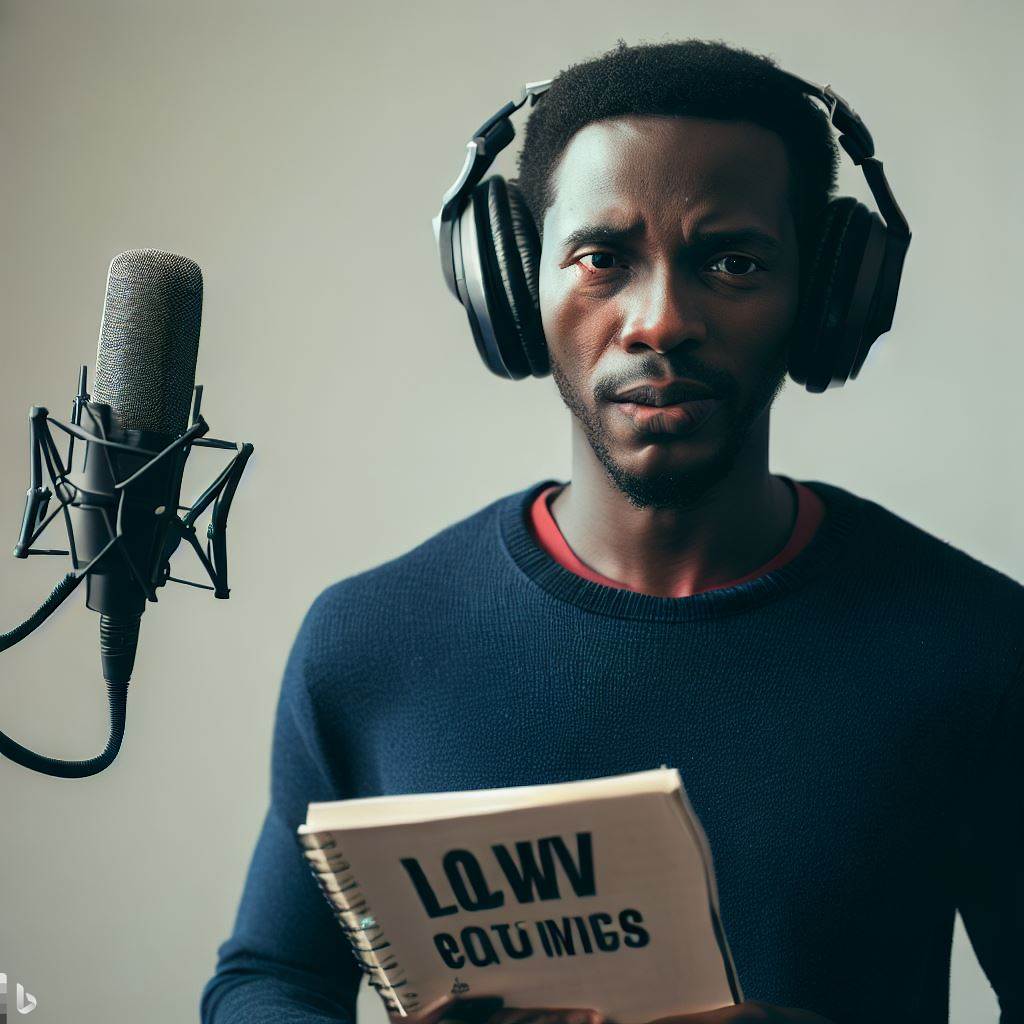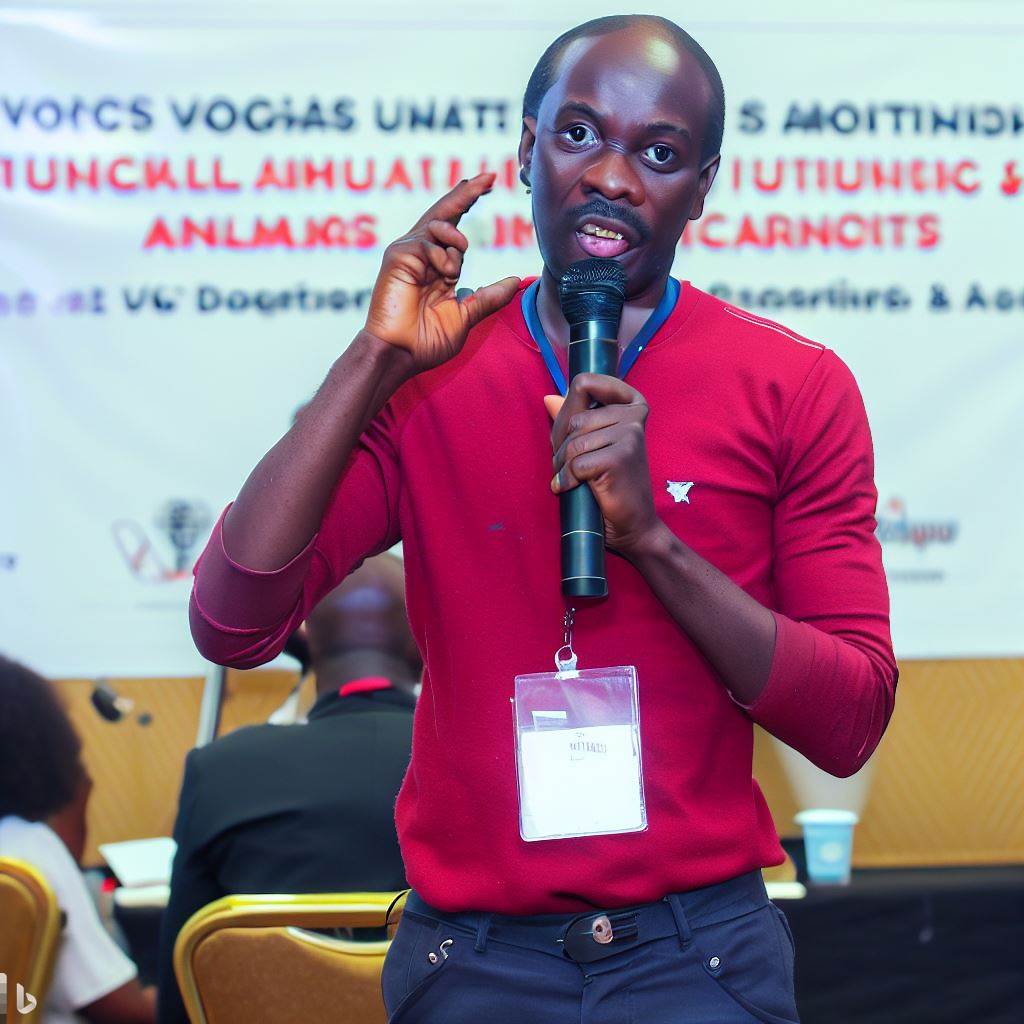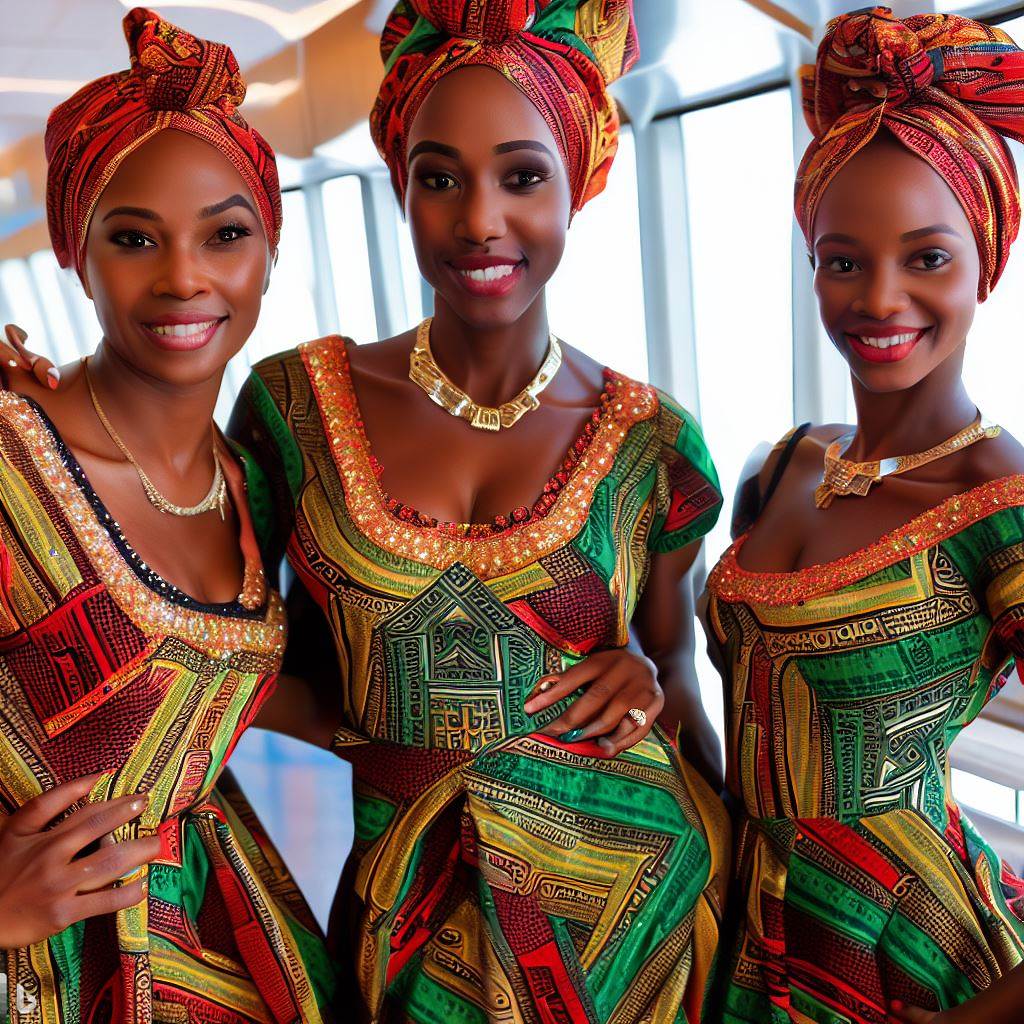Introduction
Voice acting is a crucial component in various industries, including film, animation, and advertising. In Nigeria, copyright laws play a pivotal role in protecting the creative works of voice actors.
Voice acting is the art of providing voiceovers for characters in films, TV shows, video games, and commercials.
It brings life to animated characters, adds depth to narratives, and engages the audience on an emotional level.
In the entertainment industry, voice acting contributes immensely to the success of animated films and TV shows.
Talented voice actors bring characters to life, creating memorable performances that resonate with audiences long after the credits roll.
Moreover, voice acting is not limited to the entertainment field. It extends to industries such as advertising, where captivating voiceovers are used to promote products and services.
A compelling voice can make a commercial stick in the minds of consumers, leading to increased brand recognition and sales.
Copyright laws grant creators exclusive rights over their original works, such as voice recordings.
In Nigeria, these laws aim to protect the intellectual property of voice actors against unauthorized use or reproduction.
The significance of copyright laws in voice acting cannot be overlooked.
They provide legal protection, ensuring that voice actors receive recognition and compensation for their artistic contributions.
Copyright infringement can harm the livelihoods of voice actors, impacting their ability to continue creating and pursuing their careers.
In fact, voice acting plays a vital role in various industries, and copyright laws in Nigeria serve as a safeguard to protect the rights and creativity of voice actors.
Overview of Copyright Laws in Nigeria
Copyright laws in Nigeria provide protection and rights to creators of original works, including voice actors.
These laws are crucial in ensuring that voice actors are recognized and rewarded for their talent and hard work.
A. Copyright Act of 1988 in Nigeria
The Copyright Act of 1988 is the principal legislation governing copyright matters in Nigeria.
It provides a legal framework for the protection of intellectual property rights, including voice acting.
The Act defines a voice actor as someone who contributes to the creation of sound recordings by using their voice to convey dialogue, narration, or other vocal performances.
B. Protection and rights provided by the Act
The Copyright Act of 1988 grants voice actors exclusive rights to control the reproduction, distribution, public performance, and broadcasting of their voice recordings.
This means that voice actors have the power to authorize or prohibit others from using their voice recordings for commercial purposes without their consent.
The Act also protects against unauthorized copying, adaptation, and translation of voice recordings, ensuring that voice actors are duly recognized and compensated for their work.
C. Importance of copyright laws for voice actors in Nigeria
Copyright laws play a crucial role in safeguarding the interests of voice actors in Nigeria.
- They provide a legal framework that ensures voice actors are fairly rewarded for their creative contributions.
- Without copyright protection, voice actors would be vulnerable to exploitation and piracy, leading to financial losses and the devaluation of their intellectual property.
- Copyright laws also inspire confidence among voice actors, encouraging them to continue their artistic endeavors and contribute to the growth of the industry.
In short, copyright laws in Nigeria are crucial in protecting the rights of voice actors and ensuring that they receive fair recognition and compensation for their creative contributions.
These laws provide a legal framework that promotes the growth of the voice acting industry and encourages voice actors to continue their artistic endeavors with confidence and enthusiasm.
Read: Essential Skills for Voice Actors: A Focus on Nigeria
Challenges Faced by Voice Actors in Nigeria
Voice acting is a highly competitive field that requires talent, dedication, and hard work.
However, voice actors in Nigeria face numerous challenges, particularly concerning copyright laws.
Let’s explore some of the challenges faced by voice actors in Nigeria:
A. Limited awareness and understanding of copyright laws among voice actors
Many voice actors in Nigeria have a limited understanding of copyright laws, including the concept of intellectual property rights.
This lack of awareness can result in unintentional copyright infringement.
B. Lack of enforcement and infringement issues
In Nigeria, there is a lack of proper enforcement mechanisms concerning copyright laws.
This has led to rampant infringement of voice actors’ works, including unauthorized use and distribution.
C. Difficulty in proving ownership in the absence of formal registration
Unlike some other countries, Nigeria does not require formal registration for copyright protection.
This poses a challenge for voice actors who need to prove ownership in case of infringement.
In essence, voice actors in Nigeria face numerous challenges related to copyright laws.
Limited awareness and understanding of copyright laws, lack of enforcement, and difficulty in proving ownership are some of the major challenges facing voice actors in Nigeria.
To overcome these challenges, it is crucial to enhance awareness, strengthen enforcement mechanisms, encourage formal registration, and foster collaborations within the industry.
By taking these steps, Nigeria can create a more conducive environment for voice actors and ensure the protection of their intellectual property rights.
Read: Exploring the Demand for English Voice Actors in Nigeria
Learn More: The Art of Clowning: A Look at Nigerian Circuses
Measures to Overcome Copyright Challenges
Copyright laws are critical in safeguarding the rights of voice actors in Nigeria.
However, challenges still exist in implementing and enforcing these laws effectively.
To address these issues, various measures can be taken by voice actors and the industry as a whole.
A. Education and awareness campaigns for voice actors regarding copyright laws
It is crucial for voice actors to have a comprehensive understanding of the copyright laws that protect their work.
This knowledge will empower them to make informed decisions and take necessary actions to safeguard their intellectual property rights.
Workshops, seminars, and training programs can be organized to educate voice actors about copyright laws, their rights, and how to navigate potential legal challenges.
B. Collaboration between voice actors and legal professionals
- Voice actors should seek collaborations with legal professionals who specialize in intellectual property law.
- Developing a partnership with legal experts can provide voice actors with valuable guidance and assistance in understanding the intricacies of copyright laws.
- Legal professionals can offer advice on copyright registration, licensing agreements, and protection against infringement.
- By working together, voice actors and legal professionals can strengthen the protection of creative works.
C. Importance of proactive steps such as copyright registration
Voice actors should take proactive steps to protect their work, and one crucial measure is copyright registration.
- Registering their creative works establishes a legal record of ownership and provides evidence in case of infringement disputes.
- While copyright protection exists automatically, registration provides additional legal benefits, including the ability to file lawsuits and seek statutory damages.
- Voice actors should be encouraged to register their works to strengthen their legal position in case of copyright infringement.
By implementing these measures, voice actors can overcome copyright challenges and ensure the protection of their creative output.
Education and awareness campaigns will empower them to make informed decisions, while collaboration with legal professionals will provide guidance and support.
Moreover, proactive steps like copyright registration will establish a strong legal foundation for voice actors.
Overall, the voice acting industry in Nigeria can significantly benefit from a robust understanding of copyright laws and the proactive steps necessary for their enforcement.
Strengthening the legal framework through education, collaboration, and registration will help protect the rights of voice actors and encourage innovation and creativity in the field.
Read: Mastering Different Accents: Key for Nigerian Voice Actors

Case Study: Successful Voice Actors in Nigeria
A. Prominent voice actors who have navigated copyright challenges
As the voice acting industry in Nigeria continues to thrive, it is essential to examine prominent voice actors who have successfully navigated copyright challenges.
These actors have developed strategies to protect their work and provide valuable lessons for others in the industry.
1. Chika Anadu
- Chika Anadu, a renowned voice actor in Nigeria, has faced copyright issues throughout her career.
- She took proactive measures by registering her works with the Nigerian Copyright Commission to secure legal protection.
- Anadu’s case serves as a reminder of the importance of copyright registration for voice actors.
2. Segun Arinze
- Segun Arinze, a veteran voice actor and actor, has had his fair share of copyright challenges.
- He established a strong reputation in the industry, making it easier to resolve copyright disputes through negotiation.
- Arinze’s case highlights the significance of building a reputable brand as a voice actor.
3. Ngozi Nwosu
- Ngozi Nwosu, a popular voice actor, faced copyright infringement when her voice was used without permission.
- She engaged in legal action, highlighting the importance of protecting intellectual property rights.
- Nwosu’s experience emphasizes the need for voice actors to be vigilant and take legal action when necessary.
B. Strategies for Protecting Their Work
These successful voice actors in Nigeria have employed various strategies to safeguard their creative works from copyright infringement.
- Copyright Registration: They understand the significance of registering their works with the appropriate authorities, such as the Nigerian Copyright Commission. This proactive step provides legal protection and evidence of ownership.
- Building a Reputable Brand: By establishing a strong reputation in the industry, these voice actors have garnered respect and recognition. This reputation makes it easier to address copyright challenges through negotiation and settlements.
- Vigilance and Legal Action: When faced with copyright infringement, these actors take immediate legal action to protect their intellectual property rights. They understand the importance of being vigilant and enforcing their rights when necessary.
C. Lessons to Be Learned from Their Experiences
From the experiences of these successful voice actors, there are valuable lessons that aspiring voice actors and industry professionals can learn:
- Proactively Protect Your Work: Register your creative works with relevant copyright authorities to enjoy legal protection.
- Build a Strong Reputation: Focus on developing a reputable brand in the industry, as this can facilitate the resolution of copyright disputes.
- Be Vigilant and Assertive: Stay vigilant and take swift legal action when your intellectual property rights are violated, ensuring that you enforce your rights.
- Educate Yourself on Copyright Laws: Take the time to understand the copyright laws in your country and how they apply to voice acting. This knowledge will empower you to protect your work effectively.
- Seek Legal Advice: If you encounter copyright challenges or disputes, consult with legal professionals who specialize in intellectual property law.
Most importantly, the experiences of successful voice actors in Nigeria highlight the importance of copyright protection and taking proactive measures to safeguard creative works.
By learning from these actors’ strategies and lessons, aspiring voice actors can navigate copyright challenges with confidence and protect their valuable contributions to the industry.
Read: A Glimpse at Famous Nigerian Voice Actors: Their Journey
Conclusion
Copyright laws are of utmost importance for voice actors in Nigeria. They protect their intellectual property and ensure fair compensation for their work.
Copyright laws provide voice actors with legal protection against unauthorized use, copying, or distribution of their voice recordings.
Nigeria’s voice actors face challenges such as piracy, lack of legal awareness, and difficulty in enforcing copyright laws.
To address these challenges, education and awareness campaigns should be conducted, and stricter enforcement measures should be implemented.
It is crucial for voice actors to educate themselves about copyright laws, licensing agreements, and how to register their works.
By taking proactive steps, such as watermarking their recordings and pursuing legal action against copyright infringers, they can better protect their work and ensure they are properly compensated.




